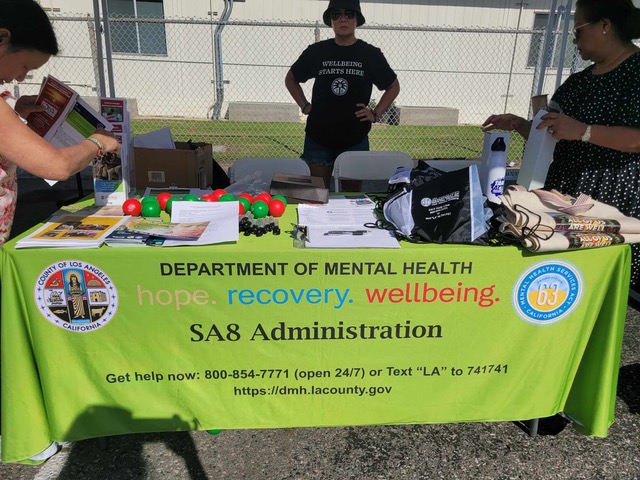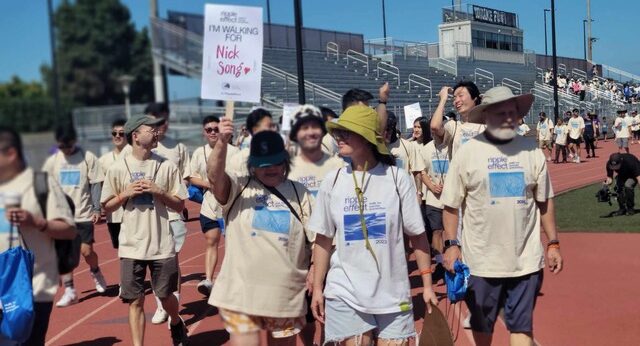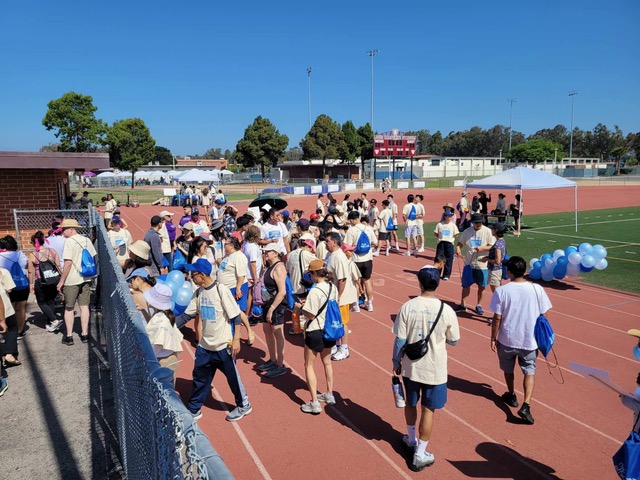By Swe Swe Aye
TORRANCE, CA — On the morning of June 22, 2024, approximately 400 people converged at Torrance High School’s Zamperini Stadium for the third annual Ripple Effect Walk, organized by the Little Tokyo Service Center.
The Little Tokyo Service Center‘s Changing Tides (CT) program hosted the walk, a poignant event designed to honor the memory of those lost to suicide while raising crucial funds for mental health initiatives within the AAPI community. The walk’s proceeds will directly support suicide prevention training and expand access to vital mental health resources, for the local AAPI community.
The event featured a poignant array of symbolic walks, each dedicated to addressing specific mental health concerns within the AAPI community. Participants could choose to partake in the “Walk for the 33%” — a 33-minute walk symbolizing the 33% of AAPI young adults who experience mental health distress — or the “Walk for 40%”—a 40-minute walk representing the 40% of AAPI LGBTQ+ youth who face similar struggles.
Walks like “A 21-Minute Walk for 21 Years of Life,” “A 28-Minute Walk for 28 Years of Life” and “A 29-Minute Walk for 29 Years of Life” provided a space for individuals to honor loved ones lost to suicide.
In 2018, four UCLA students initiated the Changing Tides program, raising funds to address mental health issues, a topic largely under-discussed within the AAPI community. This led to the inception of the Ripple Effect Walk in 2022, a significant event in suicide prevention.
Mathew Yonemura, Changing Tides program coordinator, said “Multiple families affected by suicide attempts have approached us, encouraging donations to Changing Tides instead of offering flowers. A parent’s suggestion sparked the idea of a walk for suicide prevention, which began in Long Beach.”
The initiative has steadily gained momentum, with the first year witnessing 350 participants and the second year exceeding 450. Yonemura anticipates a minimum of 425 participants this year, highlighting the growing significance of this event in addressing mental health concerns within the AAPI community.
The Stop AAPI Hate 2021 Mental Health Report paints a grim picture of the impact of the pandemic and anti-Asian hate on AAPI communities.
Anxiety levels soared during the pandemic, with nearly half of respondents to the study reporting heightened anxiety. An even larger percentage reported that anti-Asian hate was a more significant stressor than the pandemic itself.
One in five individuals who experienced racism exhibited symptoms of racial trauma, mirroring those of post-traumatic stress disorder (PTSD).
Suicide is the leading cause of death among AAPI youth and the second-leading cause among all American youth, underscoring the need for mental health support within these communities.
One in three AAPI young adults in the study reported clinically elevated symptoms of depression and general anxiety, while one in four had been diagnosed with PTSD.
The situation is particularly dire for AAPI LGBTQ youth, with over half reporting experiencing discrimination based on their race or ethnicity in the past year, exceeding pre-pandemic levels.
Dr. Mary Ann Takemoto, a clinical psychologist, identifies the lack of awareness surrounding mental health issues within the Asian American community as a significant challenge: “Many in our community have not openly discussed these topics.”

While younger generations are gradually becoming more open about mental health and seeking therapy, a considerable stigma persists. Takemoto emphasized the importance of combating this stigma through education, workshops, articles, and fostering open conversations within the community.
“Young people are more open to talk about mental health. They’re taking more advantage of the resources and information about mental health issues, including suicide prevention and warning signs, at the Little Tokyo Service Center,” she added.
CT Anchor, an initiative launched by Changing Tides, aims to equip individuals with the skills to fight these high suicide rates by offering free, accessible and comprehensive suicide prevention training and education.
“Reaching out to trusted individuals such as teachers, religious leaders, family members or friends is a crucial first step,” Takemoto said. “These initial conversations can often lead to seeking professional help.”
Takemoto also highlighted the availability of anonymous resources like mental health hotlines, which can provide a safe space for individuals to express their concerns without fear of judgment. “These hotlines offer access to trained professionals who can listen and provide support,” she continued. “I encourage everyone to utilize these resources or confide in trusted individuals in their lives.”
The Los Angeles County Department of Mental Health presented an informational booth at the Ripple Effect Walk to provide mental health resources. Assistance is available through LACDMN 24/7 by calling 800-854-7771 or texting “LA” to 741741.
“The first thing we are learning from doing suicide awareness is you can’t be afraid of the word suicide and you can’t be afraid of discussing it. It’s difficult, as the mental health stigma is hard to address,” said Yonemura.
“What do you get from an event like Ripple Effects? You see how much unity and how much community there is. People are willing to talk about mental health if you try,” he added. “If you worry about stigma, we encourage you to come out. The community is bigger than you realized and you’re never alone in your mental health journey. Events like this really show that.”
This resource is supported in whole or in part by funding provided by the State of California, administered by the California State Library in partnership with the California Department of Social Services and the California Commission on Asian and Pacific Islander American Affairs as part of the Stop the Hate program. To report a hate incident or hate crime and get support, go to CA vs Hate.






